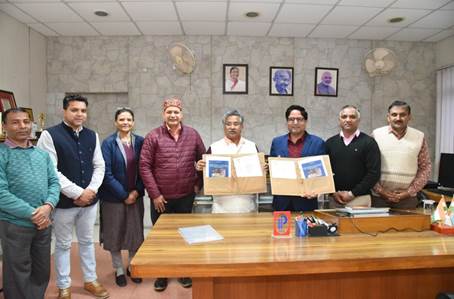Champawat: An Memorandum of Understanding (MoU) was inked on Tuesday between the Council of Scientific and Industrial Research (CSIR) Indian Institute of Petroleum, Dehradun, and the Uttarakhand Council for Science and Technology (UCOST) in a significant stride towards sustainable development. The collaboration falls under the ambit of the “Adarsh Champawat” mission, spearheaded by the Chief Minister Pushkar Singh Dhami.
During the ceremony, Dr Harendra Singh Bisht, Director of the Indian Institute of Petroleum, and Professor Durgesh Pant, Director General of UCOST, signed the MoU documents, marking the commencement of a groundbreaking project focused on harnessing technology to convert pine needles into a sustainable fuel source in Champawat.
Under this collaboration, CSIR – Indian Institute of Petroleum will implement two key technologies at the grassroots level. This includes a briquetting unit with a capacity of 50 kg per hour, utilizing pine needles, and the distribution of 500 units of Improved Cookstoves for rural households. The project will also conduct an extended field trial study to assess energy conservation and its environmental impact.
The briquetting unit, to be established in the Energy Park in Champawat, aligns with the Women Empowerment initiative, aiming to produce briquettes for use in homes and local industries, replacing traditional fuels. Dr Bisht emphasized the significance of managing pine needles to mitigate forest fires, and the briquettes’ potential to replace coal, contributing to environmental protection.
Furthermore, the CSIR – Indian Institute of Petroleum has developed advanced technology for pine needle briquetting and an energy-efficient, low-cost, natural draft biomass cookstove. The biomass cookstove, working with pine needle briquettes, boasts an energy efficiency of 35% and reduces household pollution by 70%.
Professor Durgesh Pant highlighted UCOST’s commitment to transforming Champawat into an exemplary district. He stressed the economic opportunities embedded in pine needle collection, value addition, and supply to industries. With minimal technical training, Champawat’s rural population can tap into this sector, providing a steady source of income.
Mr Pankaj Arya, lead project Scientist, outlined the holistic approach towards Champawat’s sustainable development. The project aims to foster rural entrepreneurship through training, skill development, and market linkages. Over 100 identified beneficiaries will receive training in manufacturing, operating, and maintaining biomass briquetting and advanced combustion equipment, creating new employment opportunities.
The project also envisages the revival of local women and youth’s scientific temperament and skill development through distance learning methods, workshops, and exhibitions. Dr. Sanat Kumar, Dr G. D. Thakre from the Indian Institute of Petroleum, and Dr D. P. Uniyal, Mrs Poonam Gupta from UCOST, played pivotal roles in designing the project and contributed essential suggestions for its successful implementation.
This collaboration marks a significant step towards sustainable development, energy conservation, and economic empowerment in Champawat, showcasing the commitment of the government and scientific institutions towards a greener and more prosperous future.





